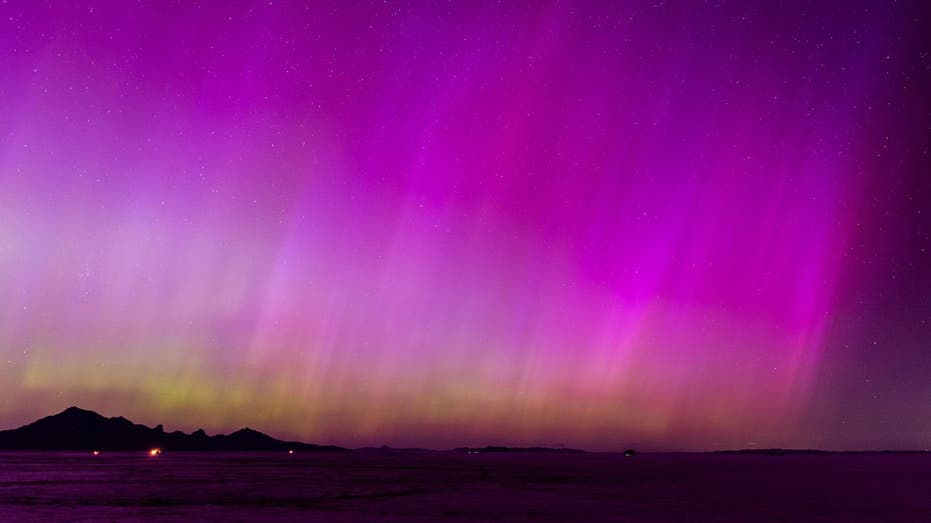Solar storm crippled GPS equipment, causing headaches for farmers
The storm disrupted GPS technology which a lot of farmers use to steer their tractors and seed the ground without overlapping rows
The huge solar storm that has been crashing down on Earth caused serious technological disruptions for farmers across the U.S. and Canada.
The geomagnetic storm lit up the night sky to make the spectacular Northern Lights visible in many states, but the natural phenomenon also disrupted Global Positioning Systems (GPS), which a lot of farmers use to steer their tractors and seed the ground without overlapping rows.
The technology also helps by mapping field boundaries, roads, and irrigation systems, as well as problem areas in crops such as weeds or disease, according to GPS.gov.
The storm came at the height of the planting season with conditions reaching level 5 on the 5-point scale of geomagnetic activity on Friday evening, according to the Space Weather Prediction Center (SWPC). The agency says its satellites observed an "extreme" event -- the first such storm to reach that level since October 2003.
HUGE SOLAR STORM IMPACTING STARLINK SATELLITES, 'DEGRADED SERVICE' REPORTED: MUSK

The huge solar storm that has been raining down on Earth caused serious technological disruptions for farmers across Northern America, knocking out their GPS equipment. (Mathieu Lewis-Rolland/Getty Images, left, and Robert Nickelsberg/Getty Images, right. / Getty Images)
The storm disrupted farming operations in the Midwest, as well as in other parts of the United States and Canada, since GPS technology has become indispensable to farmers in the modern age.
Patrick O’Connor, the owner of a farm about 80 miles south of Minneapolis, told the New York Times that he had hoped to have gotten to work Friday night after being rained out for the previous two weeks.
When he got into his tractor at around 5 p.m. he received a warning about his GPS system. He called a technical helpline and was directed to a message saying there was an outage and nothing could be done to fix it.
"I’ve never dealt with anything like this," O’Connor, who mainly grows corn and soybean, told the publication.
In Nebraska, farmer Kevin Kenney said that his operations had been shut down.
"All the tractors are sitting at the ends of the field right now shut down because of the solar storm," Kenney told 404 Media, an online publication covering technology.
"No GPS," he added. "We’re right in the middle of corn planting."
HTS Ag of Harlan, which installs GPS technology in tractors, told the Iowa Capital Dispatch, that the company was inundated with calls from its farmer customers between 3 p.m. and 7 p.m. Friday.
Earth In The Clear After Sun Emits Largest Solar Flare In Nearly 10-Year Cycle

A geomagnetic storm lights up the night sky above the Bonneville Salt Flats on May 10, 2024, in Wendover, Utah. (Blake Benard/Getty Images)
"This was the strongest geomagnetic storm to hit the planet since about 2003," Adam Gittins, the company’s president told the publication. "We won’t know the full implications of it until the crops come up."
Gittins said that’s because it’s possible that farmers who were using GPS to plant seed but were steering their tractors manually might not have noticed the technology was not working properly, Gittins said, adding that it may have led to overlapping rows and sections without seed.
The locating errors ranged from several feet to several hundred feet, he said, noting that most of his customers stopped planting and waited for the storm’s effects to subside.
Landmark Implement, which sells John Deere farming equipment across parts of the Midwest, said in a statement that the storm was an "historic event" and the accuracy of some of its systems had been "extremely compromised."
The company said it was in search of a tool that would help predict the storm in the future in order to alert customers.
GET FOX BUSINESS ON THE GO BY CLICKING HERE

Elon musk, left, said Starlink satellites were under pressure due to the storm. (Frederic J. Brown/AFP via Getty Images, left Peter Zay/Anadolu via Getty Images, top right, SpaceX, bottom right. / Getty Images)
In Canada, Facebook agricultural groups were inundated with posts about widespread GPS outages. One poster described the disruption as "a disaster" as he tried to spread manure, according to Rural Roots Canada.
Meanwhile, Elon Musk said that the storm had put Starlink satellites under tremendous strain, with the company warning on its website Saturday morning that it was experiencing "degraded service," though it didn't give further details.
The storm caused the skies across the U.S. to light up in a stunning, colorful glow. The Northern Light displays, typically relegated to states along the Canadian border during a typical geomagnetic storm, reached as far as the Gulf Coast, with pink, green and purple skies reported in Florida, Texas and Alabama.
Fox Weather and Reuters contributed to this report.

